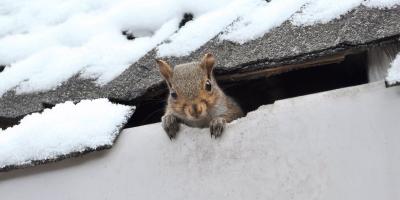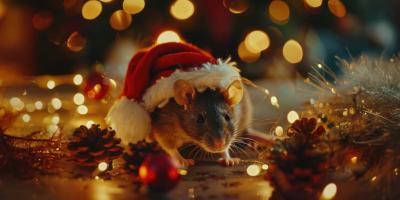DON’T FEED THE PESTS! How to Store Pet & Wild Bird Food

Have you ever wondered why your dog or cat eats so much food, but never gets fat? Ever open a bag of bird seed and have moths fly out? Animal feeds are great foods for pests as well as pets. Bug-infested or pest (mouse) contaminated food is less nutritious and may be harmful to pets. Beetle larvae that have long hairs can cause gastric upset and digestive problems.
So, where does all the food go? Some have experienced the “nightmare” of pests attacking feeds: Mice take food remaining in Fido’s dish and conveniently stash it in nearby bins, shoes, boots, attics, crawlspaces, under stairs, secluded corners, behind refrigerators, under stoves, in drop ceilings, inside cabinet false bottoms, wall voids, and so on. Mice will stash enough dog/cat/bird food to last them well into the next century.
The nightmare expands:
Next, you bring home a bag of “bargain” bird seed loaded with a surprise - meal moths!
After time, these opportunistic insect pests, also known as stored product pests, will discover the hidden mouse treasures. Within a short period of time, small moths or beetles, or a combination of both will make their presence known throughout the home. Identifying the infestation sites can be like finding a needle in a haystack because mice can easily travel and transport food to places that humans cannot reach.
Stored product pest infestations can be easily managed without the use of pesticides if the infested goods can be located and removed. However, as previously mentioned, finding all infested food caches is nearly impossible and requires the expertise of a skilled service professional. At this stage, the problem has grown from mice only to mice and stored product pests. A thorough inspection, conducted by a trained professional, will identifying the extent of the problem, species involved, and corrective action required. In many cases, the corrective action is a shared responsibility between the homeowner and the service professional.
Here is what you can do to prevent this nightmare:
- Purchase pet foods and bird seed that are free of pests. Perform a visual inspection of the bag. Don’t buy damaged or open packages. Avoid bargains and check expiration dates! Be suspicious of deals too good to be true. If you choose to buy in bulk, buyer beware and inspect CAREFULLY! Bulk foods are most susceptible to contamination and pest infestation. Don’t buy foods containing any sign of silk webbing, worms, insects, mold, or anything that appears suspicious. If the store seems to be a constant source of stored product pests, switch stores.
- As soon as you get the package home, store it in an insect and rodent proof container. Use older foods first, those closest to ‘sell-by’ date, and rotate stock by practicing FIFO (first in, first out). Glass and steel containers are best because rodents don’t like to chew through them. Five-gallon heavy duty buckets with a screw top lid are good options to store bagged food (make sure the lid is tightly sealed or pests will gain access). Only use plastic bags as a stopgap or last resort because rodents and some insects can easily chew through them.
- Check to be sure pets or wild birds are eating the food you are giving them. Be vigilant. If your pet seems to be consuming a lot more than before, investigate. Feed pets only the amount they can consume while you are present. Don’t leave food out overnight or in infrequently used areas of the house. Save yourself a big headache, DON’T inadvertently feed or encourage mice and insect pests!
- Avoid feed spills and remove and discard promptly in rodent proof trash containers. When it comes to spills, wild birds present a challenge: They are very selective eaters. In the process of finding the perfect seed, they scatter many unwanted but quite edible seeds everywhere. Rodents love this windfall all year long, and insects will join in the feast during the warmer months. Placing a shallow pan, board, or box under the feeder will help you collect most of this food spillage; remove it before nightfall when the rodents come out to feed. Winter can be a time of great stress for pests. Discouraging unwanted guests now will pay dividends in a few short weeks when their reproduction kicks into high gear! If you suspect anything is amiss ask your service professional to investigate!
Bottom Line:
Regardless of the pest in question, JP’s goal is to keep you, your family, and pets safe. Stored product pests can be a big nuisance and an expensive problem with the rising cost of food. By protecting foods from pest attack, we greatly reduce the chance of infestation. Controlling pests requires knowledge of pest biology and behavior, as well as expertise, experience, and attention to detail. There is no silver bullet or magic pill. As always, we, at JP Pest Services, strive to provide the best pest management services we can for homes and businesses. JP Pest Services is ready to meet whatever pest control challenges you may have!



